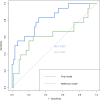Gut microbiome alterations in preclinical Alzheimer's disease
- PMID: 36445883
- PMCID: PMC9707757
- DOI: 10.1371/journal.pone.0278276
Gut microbiome alterations in preclinical Alzheimer's disease
Abstract
Background: Although some human studies have reported gut microbiome changes in individuals with Alzheimer's disease (AD) dementia or mild cognitive impairment (MCI), gut microbiome alterations in preclinical AD, i.e., cerebral amyloidosis without cognitive impairment, is largely unknown.
Objective: We aimed to identify gut microbial alterations associated with preclinical AD by comparing cognitively normal (CN) older adults with cerebral Aβ deposition (Aβ+ CN) and those without cerebral Aβ deposition (Aβ- CN).
Methods: Seventy-eight CN older participants (18 Aβ+ CN and 60 Aβ- CN) were included, and all participants underwent clinical assessment and Pittsburg compound B-positron emission tomography. The V3-V4 region of the 16S rRNA gene of genomic DNA extracted from feces was amplified and sequenced to establish the microbial community.
Results: Generalized linear model analysis revealed that the genera Megamonas (B = 3.399, q<0.001), Serratia (B = 3.044, q = 0.005), Leptotrichia (B = 5.862, q = 0.024) and Clostridium (family Clostridiaceae) (B = 0.788, q = 0.034) were more abundant in the Aβ+ CN group than the Aβ- CN group. In contrast, genera CF231 (B = -3.237, q< 0.001), Victivallis (B = -3.447, q = 0.004) Enterococcus (B = -2.044, q = 0.042), Mitsuokella (B = -2.119, q = 0.042) and Clostridium (family Erysipelotrichaceae) (B = -2.222, q = 0.043) were decreased in Aβ+ CN compared to Aβ- CN. Notably, the classification model including the differently abundant genera could effectively distinguish Aβ+ CN from Aβ- CN (AUC = 0.823).
Conclusion: Our findings suggest that specific alterations of gut bacterial taxa are related to preclinical AD, which means these changes may precede cognitive decline. Therefore, examining changes in the microbiome may be helpful in preclinical AD screening.
Copyright: © 2022 Jung et al. This is an open access article distributed under the terms of the Creative Commons Attribution License, which permits unrestricted use, distribution, and reproduction in any medium, provided the original author and source are credited.
Conflict of interest statement
The authors have declared that no competing interests exist.
Figures



References
-
- Rinninella E, Raoul P, Cintoni M, Franceschi F, Miggiano GAD, Gasbarrini A, et al.. What is the Healthy Gut Microbiota Composition? A Changing Ecosystem across Age, Environment, Diet, and Diseases. Microorganisms. 2019;7(1). Epub 2019/01/13. doi: 10.3390/microorganisms7010014 ; PubMed Central PMCID: PMC6351938. - DOI - PMC - PubMed
Publication types
MeSH terms
Substances
Grants and funding
LinkOut - more resources
Full Text Sources
Other Literature Sources
Medical

